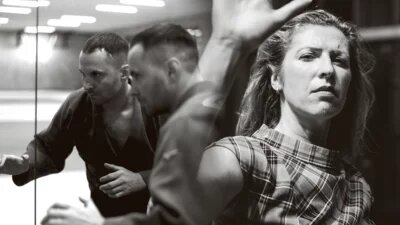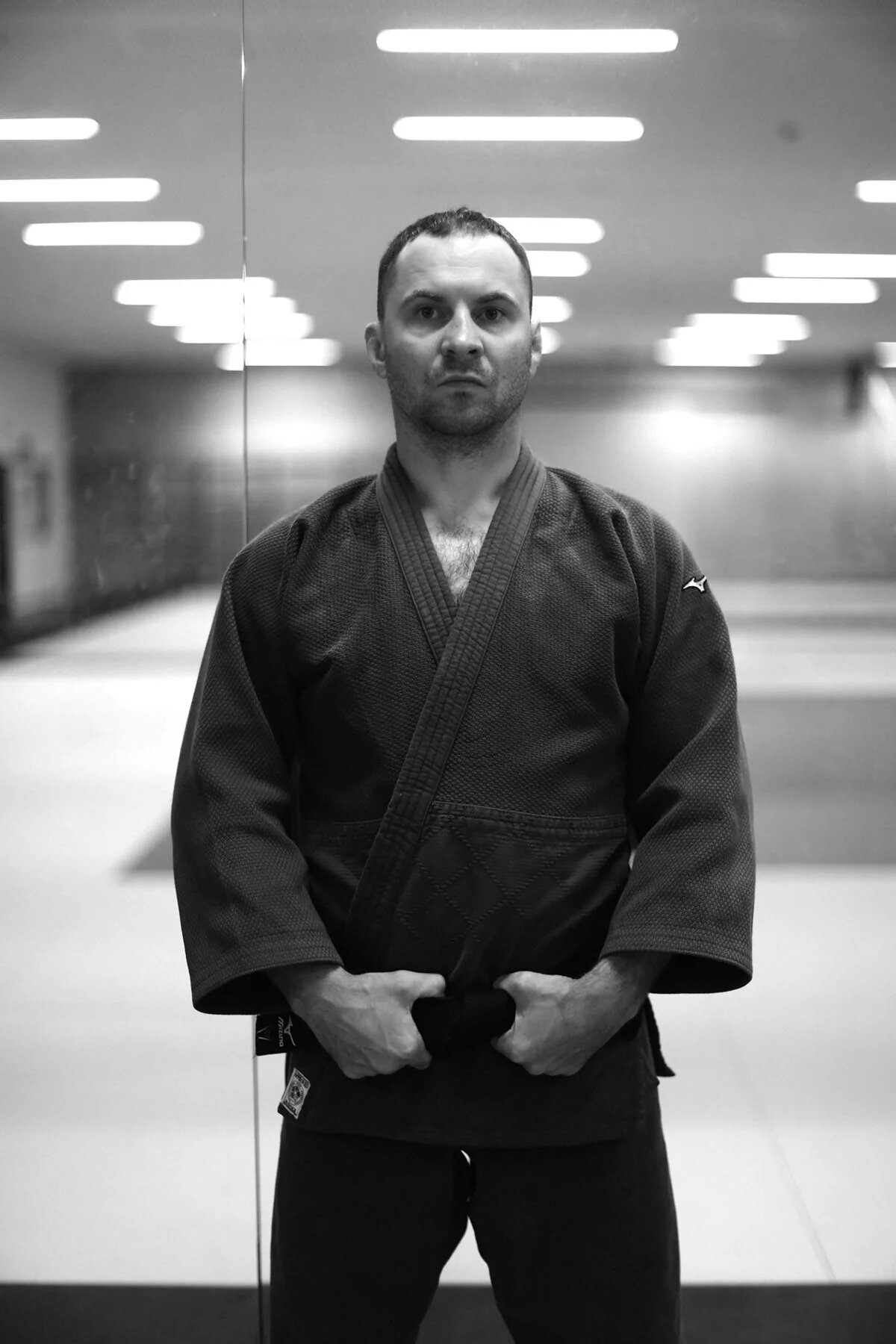Dzmitry Shershan knows how to fight. As a famous judo martial artist in Belarus, he also knows how to fight fairly. In 2016, he competed in the Olympics; two years later, he won the bronze medal at the European Championships. Today, the 35-year-old lives in Duisburg and works as a coach at the Judo Club 71 Düsseldorf. There, in the state capital, he also hosts meetings for the Belarusian exile community in Germany, «where politics and sports come together and we discuss the situation in Belarus.» Shershan has a broad smile and a well-defined biceps that peeks out from under his white muscle shirt.
Facing political persecution in his home country, Shershan fled Belarus and came to Germany in late 2021. Shortly after Belarusian President Lukashenko manipulated the 2020 presidential elections and opposition members were subjected to police brutality on the streets, he joined more than 100 other well-known Belarusian athletes in signing an open letter. «We condemn the falsification of the election results by the President of the Republic of Belarus as well as the use of brutal violence by security forces against citizens engaged in peaceful protest,» the statement read. In 2020, Shershan also participated in protests against Lukashenko, who has been in power for 30 years. «Back then, I took to the streets ten, perhaps fifteen times on the weekends,» he tells us in a Zoom conversation. «We just stood there, wanting to exercise our right to protest. None of the protesters was aggressive. The police chased us, anyway, beating and kicking the participants. It was outrageously unjust.»
Since then, the human rights situation in Belarus has only deteriorated. No less than 1,392 political prisoners are being held by Lukashenko’s regime (as of July 2024), according to figures by Belarusian human rights organization Viasna. The organization operates from exile and has been classified as an «extremist» by the Belarusian Ministry of Internal Affairs. Its co-founder, 2022 Nobel Peace Prize laureate Ales Bialiatski, is in prison. So is Viktor Babariko, presidential candidate of 2020, and his supporter and campaign manager Maria Kolesnikova. Their current condition is unknown. The families of democratic activists in Belarus also suffer harassment by the authorities. In late 2023, the writer Sasha Filipenko, a critic of the regime who lives in Switzerland, announced that his father had been arrested in Belarus for his son’s political stance. He was released after 15 days in custody.
Today, Dzimitry Shershan is an active member of Razam, the best-known Belarusian exile organization in Germany. The association was founded on August 9, 2020 – the very day Lukashenko manipulated the election results. Razam means «together». The organization counts approximately 300 members and has chapters throughout Germany, in Munich, Bremen, Hamburg, Berlin, and several cities in North Rhine-Westphalia. Among other things, Razam is a cultural association that aims to promote Belarusian language and culture, since the country is also subject to increasing Russification. At the end of 2022, there were about 29,000 Belarusians living in Germany, many of them exiles for whom Razam is an important anchor in everyday life.
Shershan organizes sports festivals and teaches judo to Belarusian children
Shershan fights for the persecuted in his home country. Two years ago, he hosted a sports festival in a park in Düsseldorf. He laid out judo mats on the ground to teach his sport to exiled Belarusian children wearing white-red-white flags, the colors of the Belarusian civil rights movement. More than 100 attendees wrote letters to political prisoners in their home country and collected donations for their children. The issue of wrongful imprisonment has become a major topic at Razam. «We have a moral obligation to help political prisoners and their families as much as we can,» Dmitry Chigrin, a board member of Razam, tells us in a Zoom conversation. According to official figures, Belarus counts more political prisoners per capita than Russia, which has 16 times as many inhabitants (9 million vs. 144 million). Currently, there are 155 political prisoners per one million inhabitants in Belarus, versus six prisoners per one million inhabitants in Russia.
Razam also provides specific assistance for the families of political prisoners in Belarus, sending them Christmas packages with school supplies and children’s toys. The only way to stay in touch with family and friends is via messaging services. Most opposition members dare not return to their country for fear of being arrested. One of Razam’s main objectives in Germany is to continuously raise awareness of the situation in Belarus. «Our goal is to support the democratic movement and to be the voice of Belarusians in Germany. We want to keep Belarus on the agenda,» says Chigrin, a computer physics expert and lecturer in Theoretical Physics at RWTH Aachen University. He has been living here since 1998. At Razam, he leads a work group to build civil society and democratic networks in Germany and the EU, for a Belarus «that will hopefully soon be free.» «It’s also important to advocate for Belarusian citizens in Germany and the EU. We also see ourselves as a lobby.»
The board deliberately chose to organize as a «registered association» under German law: «It’s a very democratic form of organization that aligns very well with our goals, our values, and our mentality,» chairwoman Yuliya Salauyova writes. Nevertheless, lobbying on behalf of Belarus is sometimes a balancing act. For many years, there have been public debates as well as legal battles about the extent to which a (non-profit) association is allowed to act politically. However, there is some elbow room for political activism – Razam’s primary mission, for example, is to monitor compliance with and respect for human rights. Meanwhile, the public focus on Belarus is waning. Since the invasion of Ukraine in 2022, attention has focused entirely on its neighbor Russia. Belarus is considered a co-aggressor in the Russian-Ukrainian war. In addition, the world’s gaze is now on Israel and Gaza. What is likely the most draconian state apparatus on European soil has slipped under the radar of media coverage. This is why back in June, Razam joined forces with other initiatives to organize an exhibition in the German Bundestag, highlighting the fate of imprisoned Nobel Peace Prize laureate Ales Bjaljazki. At the Paul-Löbe-Haus, the civil rights activist’s biography and ten-year prison sentence in Belarus were outlined on displays. His long-time companion at the NGO Viasna, human rights lawyer Leanid Sudalenka, came to visit the exhibition. He, too had been temporarily imprisoned and has been living in exile since his release. In his opening speech, he said: «I want to keep reminding everyone that Europe does not end somewhere near Warsaw. Beyond Poland lies a small, quite beautiful country that we want to see become part of a democratic Europe one day.»
Cultural mediator Ina Valitskaya helps Belarusian exiles obtain new passports
Ina Valitskaya, who hails from Orscha in eastern Belarus, has been living in Munich since 2003. She also serves on the board of Razam. For two years, the 43-year-old has organized the festival Minsk x Minga, most recently in the fall of 2024 (‘Minga’ being the local pronounciation for Bavaria’s capital Munich). When asked about political activism, she first shrugs it off: «Politics isn’t really my thing. But given the political situation in Belarus, I don’t understand how anyone can be indifferent to what’s happening there. Valitskaya sees herself as a cultural mediator; at Minsk x Minga, she organizes concerts, plays, readings, and workshops. To her, cultural festivals are also a political space. «Culture is the expression of thought, of the current political situation, and, in the case of Belarus, also of the protest movement.» She is concerned that funding for culture is often the first budget item to be cut. The Minsk x Minga festival is co-financed by the Bavarian State Chancellery. Without subsidies, it probably wouldn’t be possible. «Culture is a locomotive,» Valitskaya emphasizes in our video chat. «Societies need culture. Art and culture are very close to the people and their problems.»
At Razam, she also provides everyday assistance to exiled Belarusians. For about a year now, Belarusian expats have been unable to renew their passports at embassies abroad, and are required to travel to Belarus to obtain their papers. This is another form of harassment by the regime, intended to force expats to return. «We are working with other organizations to get this problem solved,» says Valitskaya. Razam is in touch with the federal government, the federal states, districts, and municipalities because, since the Lukashenko regime enacted this law, many Belarusians have been living in Germany without a valid passport.
Among other things, the Razam association provides psychological and medical assistance for victims of police violence.
Razam operates mental health support programs for refugees who have been victims of repression. In partnership with other organizations like Libereco, the association also provides medical assistance to victims of police violence. There is a special focus on the LGBTQ community, which is criminalized in Belarus. In Hamburg and Berlin, Razam hosted events that cater specifically to this community. They also hold memorial events. In several cities, Razam commemorated the «Night of the Executed Poets» of 1937 when, during Stalin’s Great Purge, the Soviet secret service murdered 132 members of Belarus’ intellectual elite in Minsk in a single night, including many writers and poets.
Language is another big issue at Razam. Belarus is, in fact, a bilingual country. Even though Belarusian is one of the country’s two official languages, Russian dominates. As Lukashenko seeks proximity to Russia, his language policy is part of a systematic Russification of a country whose citizens expressed a desire to move towards the EU and democracy in 2020. The civic opposition in the country continues to advocate for the Belarusian language, not least to distinguish itself from its Russian neighbor. In Germany, Razam organizes events in the Belarusian language, from readings and discussions to film screenings and children’s events. «Perhaps this will encourage more people to speak the language,» says Valitskaya. «I myself also only started speaking it a few years ago.» Dzmitry Shershan is currently recovering from meniscus surgery, which forced him to take a break. Soon, he will start training as a physical therapist in Germany. He is ready to get back to fighting, both on the judo mat and, of course, on behalf of Razam.
Jens Uthoff is an editor at the daily newspaper die tageszeitung (taz). In recent years, he has focused on the political situation in Eastern Europe, particularly in Belarus, the Baltic States, and Ukraine.
The Razam association was founded on August 9, 2020, the day Lukashenko manipulated the election results. The organization counts approximately 300 members in chapters throughout Germany, in Munich, Bremen, Hamburg, Berlin, and several cities in North Rhine-Westphalia. At the end of 2022, there were about 29,000 Belarusians living in Germany, many of whom in exile.


